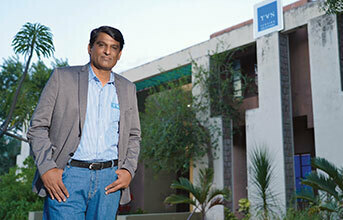
How has sensor technology evolved to enhance the overall performance of auto components?
Sensors play an essential role in today's auto component industry. They monitor engine performance, emissions, and fuel usage. With this widespread sensor integration, manufacturers are now able to offer vehicles that prioritise safety, fuel efficiency and driving comfort. In future, vehicles will offer a real-time comprehension of both the external surroundings and the behaviour of their occupants. Therefore, the future of the automotive industry will be heavily influenced by sensor technologies.
How TVS Sensing Solutions are driving advancements in safety, performance, efficiency, and connectivity with advanced sensor technology?
The key driving factor is the rising demand for better safety and security in vehicles. Government regulations are promoting adoption of automotive sensors in various vehicle systems like body control, power steering, temperature regulation and antilock braking. These features are gradually becoming standard in vehicles, encouraging sensor manufacturers to include them as common options in their product offerings.
For example, our Active Wheel Speed Sensor is a key auto component that monitors the speed of a vehicle's wheel. It is important for the anti-lock braking system, using the sensor to prevent skidding during sudden stops and thereby improving control and road safety.
What role do sensors play in optimising the fuel efficiency of various auto components, and what improvements have been observed?
Sensors for auto components keep an eye on things like engine temperature and fuel mix to make sure the vehicle runs efficiently. Our fluid level sensor helps improve fuel efficiency by monitoring the quantity of brake fluid in a vehicle's braking system ensuring safe and efficient brake performance.
What manufacturing processes do you employ to ensure the precision and consistency of your products, and how do these processes meet the specific requirements of the sensors, solenoids, switches, and electronic components industry?
Application engineering and customisation tailor components to specific vehicle needs and adapts parts for specific models. Auto component manufacturing incorporates several key processes, like cable harness manufacturing, vertical injection molding machines, horizontal and vertical injection molding, resistance welding machine utilisation, core riveting, crimping core tube assembly, coil winding, enamel removal, crimping, and automated assembly workstations. These processes guarantee that our products meet the safety, performance, and quality standards of the automotive industry.
Our manufacturing facilities are equipped with custom-built End-of-Line (EOL) testers, performance testing setups and leak testers to ensure the quality and reliability of our auto components. We also use advanced tooling technologies including Vertical Machining Centers (VMC), Wire EDM, Spark Erosion, Grinding, and Milling, to precision-engineer components to meet the highest standards.
In what ways is your company working towards enhancing the sustainability of its products, manufacturing processes, and operations, considering the global focus on environmental impact reduction?
We are committed to incorporating sustainable principles seamlessly into our product development and solutions, while focusing on resource efficiency and life cycle assessment. We uphold supply chain sustainability, prioritising ethical practices and fair labour conditions. Our proactive initiatives aim for a net-zero impact, encompassing water conservation, energy-efficient LED lighting, and solar panel installations.
How has the growing demand for Electric Vehicles (EVs) impacted your business, particularly in terms of product demand and innovation?
EV sector is undergoing significant changes driven by industry trends, presenting promising growth opportunities and the potential for success. To address these trends, we're working on solutions specially designed for electric vehicles and those utilising standalone and connected series IIoT, focusing on sustainability needs.
Our offerings encompass ARAI-approved DCDC converters, Tire Pressure Monitoring Sensors, Side stand sensors, Throttle Position Sensors, and Acoustic Vehicle Alert Systems. Furthermore, our commitment extends to expanding our product portfolio with upcoming additions, including Oxygen sensors, Integrated sensors, and Advanced Driver Assistance Systems (ADAS).
Are there any recent technological advancements or innovations in your sensor technology that you'd like to highlight?
We are dedicated to expanding our product portfolio further, with upcoming additions including Oxygen sensors and Integrated sensors. This also includes the addition of the fully automated SMT line that fuels the capability to handle high volume electronic products. All our products are rigorously tested to ensure reliability, durability and reduce maintenance requirements enhancing the overall performance and efficiency of electric vehicles.
Can you highlight any unique features or technologies that set your products apart from competitors?
At TVS Sensing Solutions, we have mastered the manufacturing process in the insert molded space for sophisticated product assemblies. On the sensor domain, our focus is on combining several sensing elements into one unit for space saving and better pricing to customers.
How are environmental sensors being employed to ensure compliance with emission regulations and improve the performance of emissions control components?
Environmental sensors are critical in addressing environmental issues stemming from industrial growth and urban development. They can be adapted for various purposes, such as detecting vehicles with high emissions. These sensors monitor and manage the environmental conditions and fuel efficiency of vehicles. Currently, we supply sub-assemblies in turbo chargers for emission controls in vehicles.
Continue reading on page 2


























